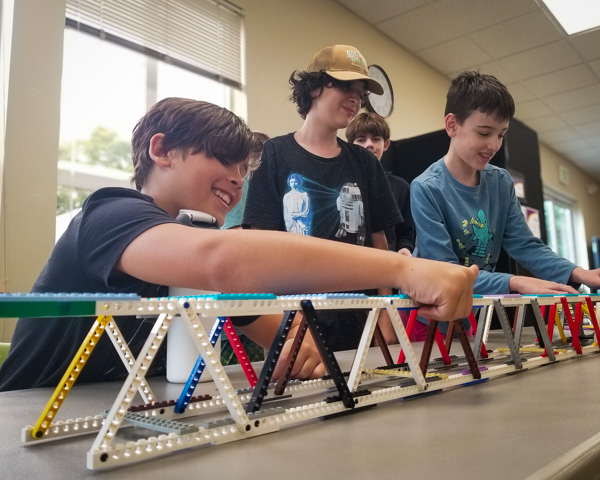Our 6th-8th graders attend our middle/high school campus, where they experience a larger school community and prepare for the expectations of high school. At this age, we see great variety in maturity and readiness for higher academic skills and levels, so we keep classes highly engaging with teachers who adore this age group. Students develop a variety of school skills, adopt new learning strategies, and receive crucial support as their social circle evolves and their desire for independence increases.
Every Chrysalis student engages in a personalized course of study based upon their learning needs and preferences. We create a unique schedule for every child with a combination of individual appointments and group classes.

Academic Success
Every child’s school program is unique at Chrysalis. Our placement team carefully selects teachers, classes, and experiences for each student based on their interests, abilities, and needs. Our goal is to create an Optimal Learning Environment™ for every subject, to ensure a positive, successful learning environment. We allow every student to work at their “just right” level of challenge, which minimizes stress and optimizes learning.
All students have 1-1 appointments in their schedule with their teachers, who tailor the class and focus on their learning needs specifically. Our teachers have access to a variety of curricula across grade levels, so students can learn any skill in any grade. They may work at grade level in some subjects, above grade level in others, and take their time to really learn the material in subjects where they struggle.
1-1 appointments allow more time to learn a concept or skip over concepts students already know. Teachers can use topics and materials that pique a student’s interest to boost engagement. They are able to answer student questions on the spot, in private, and continually assess and adapt to the student’s progress in a more natural and accurate way than traditional testing allows. In the 1-1 environment, the teacher easily knows what their student has mastered through observation and discussion. Students who are less interested in a subject or are easily distracted will learn best in a 1-1 environment. Those who qualify can take advanced courses for high school credit, and all middle school students complete Washington State History (the first requirement toward high school graduation) at this time.
We also offer small group experiences throughout the school day. Our small group classes are composed of 12 students or less in multi-age classes formed with students’ personalities, social maturity, and academic ability in mind. These teacher-directed groups engage in experiential, hands-on, and discussion-based group learning activities, while also introducing and practicing key school skills that will prepare them for high school.
We believe that school is a place to uncover and build a child’s strengths by putting opportunities for growth in their path. A student’s program should reflect who they are–that means lots of arts classes for some, extra STEM classes for others, or some combination of everything. Students are more engaged and more apt to build foundational learning skills when their school day reflects what sparks their interests and curiosity.
Community
At this age, students have a thirst for more independence and “play” becomes much more social. Between classes, they have access to our Activity Room, where teachers whose expertise is in social-emotional development oversee student activities and interactions. Students have a lot of choice in this classroom–from socializing with friends, to shooting hoops or playing ping pong, to finishing up assignments or planning for student events. The Activity Room is the social center of our school, where students can navigate and negotiate friendships and community in a safe space, and learn conflict resolution and leadership skills.
When students need a less active environment, they can access our quiet space upstairs. These unstructured times throughout the day encourage development of executive functioning (including problem-solving, decision-making, and goal-setting abilities), social and emotional maturity, self-direction, and sense of control. It’s important for students to have choices about the activities they engage in during the day. Time to let down and process information prepares them for what’s next in their day.
Events and activities are determined and led by students through our Associated Student Body (ASB) club and our chapter of the National Honor Society. We typically have dances, field trips, pancake breakfasts, ski trips, movie nights, spirit weeks, and much more throughout the year.
Developmental Considerations
The middle school brain is incredibly unique. In this phase of development, students need more support than most adults recognize as their brains are developing and their interests are expanding. They are learning to organize their work, use their time well, try out new language, understand friendships, and explore who they are. We value this part of their development and teach the academic and communication skills they need, as they need them.
We provide close mentorship through an advisory appointment each week with their consulting teacher. This teacher serves as their primary advocate and leader of their teaching team and can address any academic or social issues that arise during this time, including homework development, study skills, advice on friendships, etc. Establishing relationships is key to student growth in this phase of development.
Middle School Schedule
Students have an individualized schedule with a combination of 1-1 appointments, small group classes, activities and study time, This means their schedules vary. Some students need a later start to their day, some participate in sports and need a shorter day. Some students travel for competitions and need Fridays off. These scheduling needs are taken into consideration when students are placed in classes. In addition to their core classes (language arts, math, social studies, and science) they can choose from a variety of elective offerings, including art, painting, design, drama, computer programming, electronics, makerspace, Photoshop, five world languages, and much more. Students are welcome to invent or direct their own courses too!
Course Catalog